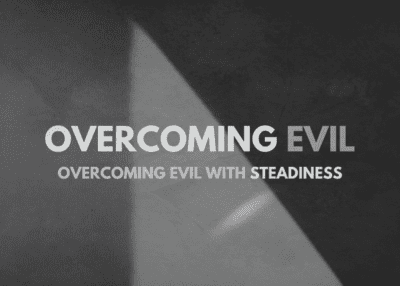“I just feel a bit…” My friend furrowed her brow as she wrestled to find the exact word.
“Stagnant,” she finally said, with a despondent look on her face. Without the regular accountability of attending church in person, and with the disruption of everyday routines and her tiring shift patterns in pediatric intensive care, she was struggling in her faith.
It’s not the greatest word, is it? A puddle is stagnant when it’s been there a bit too long with no fresh rain falling on it. Water so murky, it no longer reflects the sky like it used to.
I have to be honest in saying that, throughout COVID-19 lockdown, I too, struggled with feeling stagnant—and I’ve written a whole book about meditating on God’s word! I was still in the habit of Bible reading, but let’s be honest: there’s a fine line between a habit and a rut. I wasn’t being changed by what I was reading, and so I wasn’t reflecting God at all well to those around me.
There’s help for stagnant hearts in Proverbs 2:1-6, where the Bible teaches us how to read the Bible.
Reading the Bible is Like Searching for Hidden Treasure
My son, if you accept my words and store up my commands within you, turning your ear to wisdom and applying your heart to understanding—indeed, if you call out for insight and cry aloud for understanding, and if you look for it as for silver and search for it as for hidden treasure, then you will understand the fear of the Lord and find the knowledge of God. For the Lord gives wisdom; from his mouth come knowledge and understanding (Prov. 2:1-6, NIV).
In this passage, listening to God’s word is likened to searching for hidden treasure. That helps us know how to read the Bible and get past that stagnant feeling about it.
Let’s just slowly walk through that description and dig deeper into what those words mean. Searching. Hidden. Treasure.
Treasure
…if you look for [God’s Word] as for silver and search for it as for hidden treasure, then you will understand the fear of the Lord and find the knowledge of God (Prov. 2:4-5).
Treasure. That’s how the writer of Proverbs describes God’s word in verse 4. Why? Proverbs 2:5 further defines the reward for searching in God’s word: we will “understand the fear of the Lord and find the knowledge of God.” Infinitely weightier than any worldy treasure, of supreme worth, we can know this God! What riches!
When our hearts are stagnant, we reach for the Bible on the shelf without being prepared for how weighty it is. We need to raise our expectations—of Scripture. Bible reading is far more than ticking off a box on the reading plan. Through it we can know God! What greater treasure could we ever hope to find?
Hidden Treasure
…indeed, if you call out for insight and cry aloud for understanding…then you will understand (Prov. 2:3,5).
Why is this treasure “hidden”? Proverbs 2 shows that it’s hidden in the sense that it is a gift that the Lord gives, for “from his mouth come knowledge and understanding” (v. 6). And verse three hands us the tools with which we are to dig: “call out” and “cry aloud.”
If we dig into Scripture armed only with the tools of our own experience, it’s little wonder that our hearts are unmoved by what we read. We need to lower our expectations—of ourselves. Whether we are Bible scholars or baby Christians, we must recognize that we cannot know God unless he gives understanding. Believing that the Lord promises to give wisdom (v. 6), we can ask him for more insight.
Searching for Hidden Treasure
…accept my words and store up my commands within you, turning your ear to wisdom and applying your heart to understanding… (Prov. 2:1-2).
Searching is not easy. As we call out to the Lord for insight, we must also turn our ears and apply our hearts (v. 2). This is a real challenge, especially at this time when we are physically separated from our churches. Going to “church online” can result in Zoom fatigue, lack of accountability when watching alone, and struggling to concentrate. There are things we can do to help ourselves, such as taking notes and connecting with a friend to discuss what we are learning. But, essentially, turning is repenting: confessing where we have been distracted by the treasures of this world, and turning to Christ for forgiveness and help to treasure him.
Searching implies a goal: finding the treasure. Proverbs 2:1 tells us what to do when we find it: accept and store up. Proverbs challenges us to think of our hearts as a treasure chest—far from a stagnant, murky puddle. Seven times in six chapters of Proverbs, we are told to store up God’s commands within us, to write them on the tablet of our hearts (2:1, 3:1, 3:3, 4:21, 6:21, 7:1 and 7:3). Memorizing God’s word is integral to the vitality of our walk with the Lord.
We’re quick to put in the effort to help our kids memorize maths equations to pass exams. Do we invest even a fraction of that effort into learning treasure that is of eternal value? Writing a little symbol on our hands or texting a Bible verse to ourselves can help us remember the truth we’ve learned and can motivate us to repent of ways we haven’t lived in line with it. Meditating on God’s word throughout the day can help us to obey and worship God.
The moment we put away our Bibles without capturing what we’ve learned and deciding how we will store up that truth throughout the day, we’re in danger of walking away unchanged. When we open our Bibles searching for hidden treasure, as Proverbs 2:1-6 instructs, the Lord transforms our hearts.
Stagnant puddle or treasure chest: which do you want your heart to be?
Photo: Pixabay






